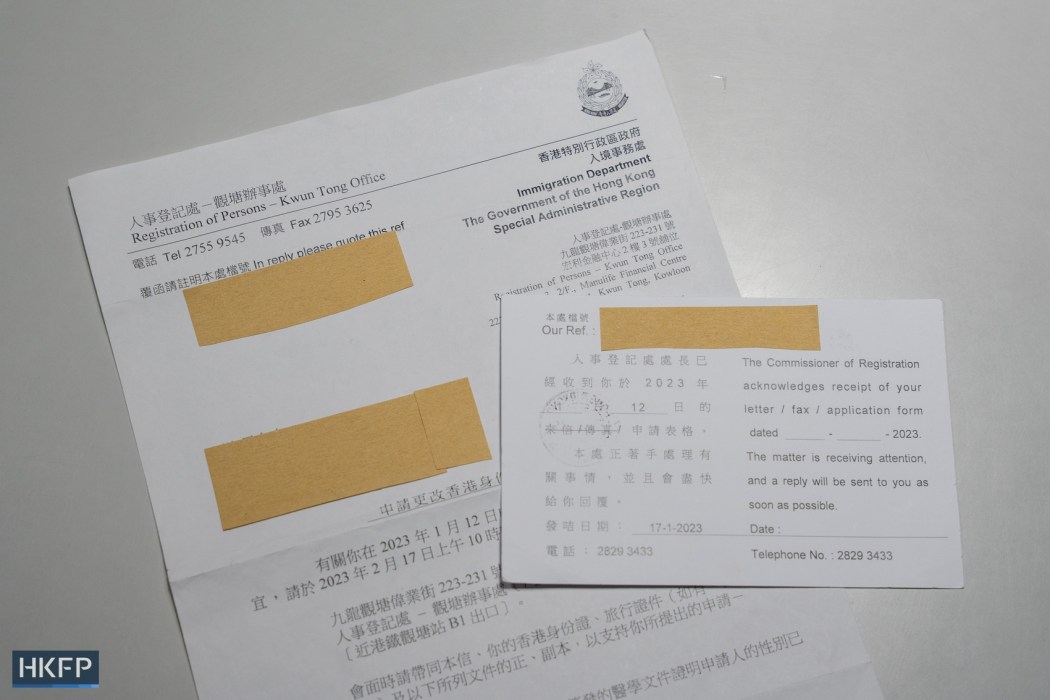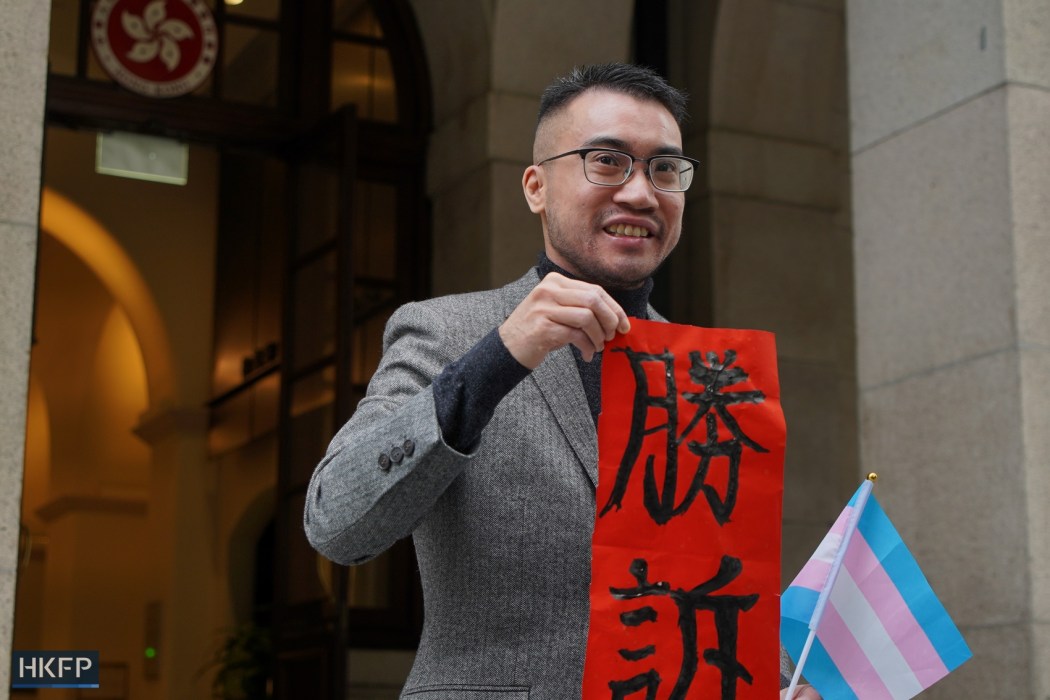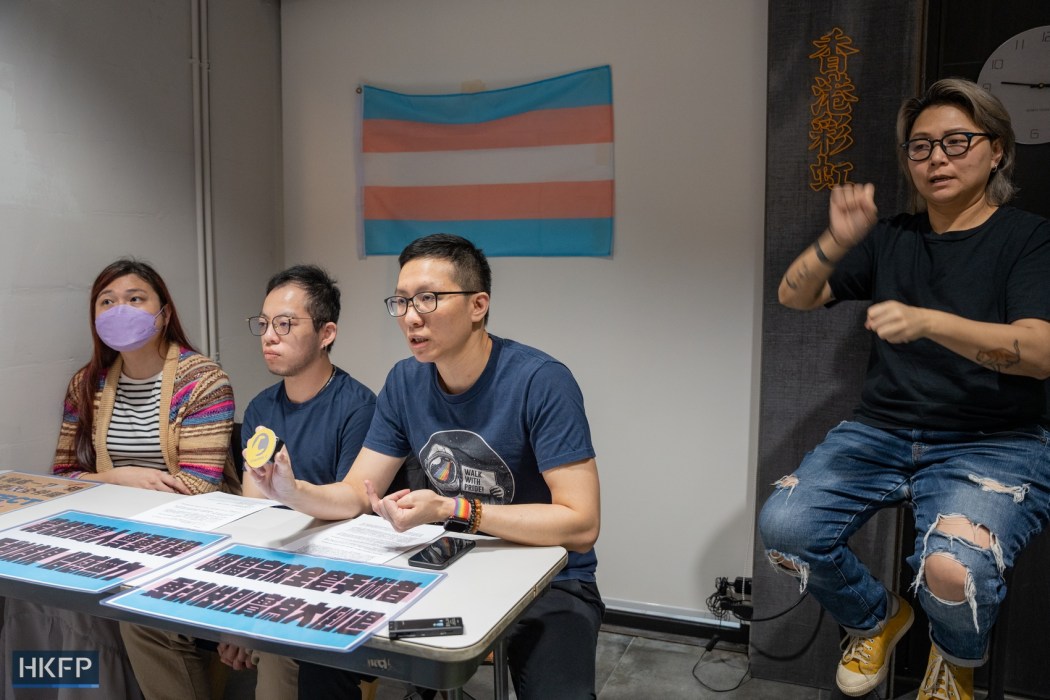Ryousuke, a deaf transgender man, was excited to finally be able to change the gender marker on his Hong Kong identity card after undergoing full sex reassignment surgery (SRS) last November.
However, his application, which was submitted to the Immigration Department in January, was suspended in February following a top court ruling ostensibly in favour of transgender individuals.

Under current regulations, transgender individuals must undergo full SRS before they are allowed to change the gender marker on their ID card.
But the Court of Final Appeal ruled on February 6 that the policy was in violation of the Hong Kong Bill of Rights, and that the rule “imposes an unacceptably harsh burden on the individuals concerned.”
Following the ruling, the Immigration Department stated on its website that the department “is studying the judgement carefully and reviewing” the policy, and that it “shall seek legal advice on follow up actions to comply with the judgement.”
The department’s website did not specify how the ruling would affect those who have undergone full SRS, or that the processing of applications to change gender markers would be suspended.
The Immigration Department told HKFP on Friday night that it aimed to complete the policy review “in reasonable time.” However, the department did not respond directly as to why applications from transgender individuals who have undergone full SRS have been suspended.
The department also said that when it came to handling cases of to people with disabilities, it would “adopt appropriate measures” in a cautious manner to care for the needs of different individuals. There were also access officers on duty in each office to provide help to those who needed it, the department said.

While the top court decision was a victory for his community, it should not have impacted Ryousuke, who had fulfilled the full SRS requirement under the existing rules.
“When I completed all my operations, I was really happy, and I was preparing to apply to change my ID card,” Ryousuke said though his interpreter.
“Who would have thought that they would tell me my [application] was suspended. I think it is very unreasonable… It was like going from heaven to hell, and I am furious.”
Ryousuke filed his application to the Immigration Department on January 12, and received a letter from the department on January 19 saying that it had received his application on January 17.
However, when he went alone to the Registration of Persons Offices in Kwun Tong on February 17, just over a week after the top court ruling was made, Ryousuke was told that his application would be delayed because of the court decision.
Ryousuke said that the officer communicated with him by writing on pieces of paper, but the notes were thrown away before he could take them. In the end, the officer gestured to Ryousuke, telling him to go home.
“I did not really understand what was happening… I had already completed all the surgery, why did they not let me change my ID card? The court ruling said that [the policy] has to be relaxed,” said Ryousuke through his interpreter.
“It was really unfair.”

Kenn Chan from PrideLab said that the process to change the sex entry on ID cards usually takes two to four weeks after meeting with the Immigration Department to submit all documents.
After Ryousuke’s meeting on February 17, Chan and interpreter Cat accompanied him to meet with the officer three days later. They were told that as the full SRS requirement was ruled to be unconstitutional, all applications had to be suspended until the relevant regulations were reviewed.
Removing hurdles
Changing his ID card was not only a step in Ryousuke’s journey to finding his own identity, it is also a crucial step in eliminating hurdles in his day-to-day life as a deaf person.
As a holder of an Octopus card for people with disability, Ryousuke is often stopped by MTR staff members to check his eligibility, a process that is complicated by not having an ID card with a male gender marker.
As the photos on his Octopus card and his other identification documents looked very different to how Ryousuke looks now, he is frequently suspected of using another person’s identity.

“Sometimes it takes very long for me to explain, and I can be late because of this,” said Ryousuke. “I won’t know if my employer will fire me for being late so often.”
As a result, Ryousuke carries a stack of documents with him, from doctor’s letters to his passport, whenever he goes out.
“Now I always carry doctor’s notes and identification documents, when one document does not work, I give them the next one,” said Ryousuke.
Linus Chan, administrative director of PrideLab, said that an ID card reflecting a person’s acquired gender would solve many of the daily problems faced by transgender people.
“Even for someone who is not deaf, if you have to come out of the closet in public… and explain what surgery you have undergone, what are your sex organs, it is in itself a very humiliating process, and very difficult for many people,” said Chan.
PrideLab urged the Immigration Department to resume handling the applications from people who have already satisfied the original requirement, and complete the regulation amendment to comply with the top court ruling within three months.
Calling a deaf person
Ryousuke’s application to change his ID card was further complicated by the Immigration Department’s lack of support for deaf people.
According to Chan, there was no option for Ryousuke to write down his email address – or to indicate that he was deaf – on the Immigration Department’s application form.

Ryousuke missed a call from the department on January 20, and had to ask a friend to call them back on the same day.
While his friend told the officer who answered the phone that Ryousuke is deaf, and asked them to communicate with him through email, when Ryousuke went to his appointment on February 17, the officer denied the department had received that call.
Chan said that Ryousuke provided his email address on another Immigration Department form, but the department still chose to call him instead of emailing.
“I understand that calling is much more direct, and sending letters is slow,” Chan said. “However, why did [the department] not use email, when it is such a reliable and quick means which can also provide a written record?”
PrideLab also called on the Immigration Department to review its forms to allow those in need to choose communication methods that suit them.
While the officer who met with Ryousuke said there was room for improvement and that they would reflect the situation to their superior, Ryousuke has since filed a complaint to the Equal Opportunities Commission, and is awaiting the watchdog’s response.
Support HKFP | Policies & Ethics | Error/typo? | Contact Us | Newsletter | Transparency & Annual Report | Apps
Help safeguard press freedom & keep HKFP free for all readers by supporting our team

LATEST FROM HKFP
HKFP has an impartial stance, transparent funding, and balanced coverage guided by an Ethics Code and Corrections Policy.
Support press freedom & help us surpass 1,000 monthly Patrons: 100% independent, governed by an ethics code & not-for-profit.










